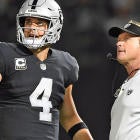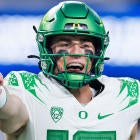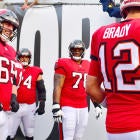The 2016 Raiders were one of the feel-good stories of the NFL. General manager Reggie McKenzie was named NFL Executive of the Year after an arduous rebuilding process culminated with the end of a 14-year playoff drought and the number two seed in the AFC. The 12 regular season wins were the franchise's most since 2000. Playoff success eluded the Raiders with quarterback Derek Carr, who finished tied for third in the MVP voting, lost late in the season to a broken leg.
The Raiders entered 2017 as a popular pick to dethrone the Super Bowl champion Patriots. After a disappointing 6-10 season, Jon Gruden was coaxed out of the "Monday Night Football'' broadcast booth after a nine-year hiatus to return to coaching with a 10-year, $100 million contract from Raiders owner Mark Davis. The type of money given to Gruden, who previously coached the Raiders 1998-2001, suggests he is the organization's main power broker although McKenzie has retained the title of general manager.
The 2016 season seems like a football lifetime ago in Oakland. Gruden's second stint with the Raiders is off to a rocky start with a 1-5 record. Older players were targeted in free agency in an effort to be more competitive than last season. The oldest opening day roster in recent years with an average age of 27.4 years was assembled according to PhillyVoice.com's Jimmy Kempski, whose data goes back to 2012.
It seems like anything connected to McKenzie is being shown the door. Most notably, 2016 NFL Defensive Player of the Year Khalil Mack, who was engaged in a contract dispute that didn't appear to have an end in sight, was traded to the Bears on Labor Day weekend. The Bears gave up their next two first round picks and Mack got the blockbuster contract making him the NFL's highest paid non-quarterback that the Raiders wouldn't. 15 players from McKenzie's 2014-2017 draft classes have been released, traded or left via free agency since Gruden was hired in January.
The Raiders appear to be in complete teardown mode after this week's trade of wide receiver Amari Cooper, 2015's fourth overall pick, to the Cowboys for a 2019 first round pick. Gruden reportedly told ESPN's Chris Mortensen that nobody else would be traded after Cooper, contradicting McKenzie, who said no one is untouchable. 2017 first-round pick Gareon Conley, who was recently benched at cornerback, is drawing interest from other teams ahead of the October 30 trading deadline according to CBS Sports Insider Jason LaCanfora. 2016 first-round pick Karl Joseph is also rumored to be on the trading block. The safety has gotten into Gruden's doghouse.
What About Derek Carr?
Gruden's dismantling of the Raiders has prompted speculation that Carr will be gone in 2019. Carr hasn't thrived under Gruden's tutelage. Although Carr is second in the NFL with a 71.7 completion percentage, his eight interceptions are tied for third most in the league. Carr is also refuting reports that his relationship with teammates is deteriorating and confidence in him internally is waning.
Gruden has a reputation for being extremely demanding of his quarterbacks and souring on them quickly. The only one that lived up Gruden's high expectations was Rich Gannon. During their three years together in Oakland (1999-2001), the Raiders won the AFC West twice and Gannon earned Pro Bowl honors each season.
Getting a tremendous value for Cooper could provide justification for the Raiders to demand a king's ransom in order to deal Carr. It wasn't too long ago that Carr was drawing comparisons to three-time NFL MVP Aaron Rodgers. Obviously, Carr hasn't done much to validate the comparison since his own MVP candidacy.
The much-maligned Jay Cutler was traded in 2009 after his third NFL season, to the Bears with a 2009 fifth round pick for quarterback Kyle Orton, 2009 first and third round picks, and a 2010 first round pick. Sam Bradford's trade in 2016 might be a better barometer of what Oakland could get for Carr. The Eagles received a 2017 first round pick (14th overall) and a conditional 2018 fourth round pick from the Vikings after Teddy Bridgewater went down late in the preseason with a career threatening knee injury. The fourth round pick could have elevated to a third or second round pick under certain conditions, which weren't met.
The remaining four years of the five-year, $125.025 million contract extension Carr signed in June 2017 to become the league's first $25 million per year player are reasonable with the recent explosion in quarterback salaries. Carr is under contract through the 2022 season for just over $78.5 million. The Raiders would pick up $15 million of 2019 salary cap room by trading Carr next offseason. There would be $7.5 million in dead money, a cap charge for a player no longer on the roster, relating to the signing bonus proration from Carr's 2019 through 2021 contract years.

Gruden's track record with the Buccaneers
The trades have put the Raiders in a position to control the 2019 and 2020 NFL drafts with a bevy of picks and cap room to jumpstart a rebuild before the scheduled move to Las Vegas in 2020. The Raiders have five first round picks over the next two years. If the 2018 season ended today, the Raiders would have the fourth, 10th and 17th picks in the 2019 draft.
Oakland has $125.22 million of 2019 cap commitments with 32 players under contract after the Cooper trade. Under offseason accounting rules, the top 51 salaries (i.e. cap numbers) matter. The 2019 salary cap will be in the $190 million neighborhood with a similar increase as in recent years. After factoring in a full complement of players counting against the cap and the carry over the existing cap space of approximately, $6.5 million, the Raiders should have right around $60 million of room in 2019.
Gruden's track record with the Buccaneers after he assumed complete control late in the 2003 season when general manager Rich McKay left because of a strained work relationship between he and Gruden should be a cause for concern. The draft classes under Gruden's direction produced one Tampa Bay pro bowler, offensive guard Davin Joseph. The 2006 23rd overall pick was named to the Pro Bowl in 2008 and 2011 during his eight seasons with the Buccaneers. 2008 20th overall pick Aqib Talib didn't develop into a perennial Pro Bowl cornerback until Tampa Bay traded him. 2008 third-round pick Jeremy Zuttah participated in the 2016 season Pro Bowl as a replacement for center Maurkice Pouncey while playing for the Ravens.
2004 first-round pick Michael Clayton made the All-Rookie team after catching 80 passes for 1,193 yards with seven touchdowns. 2005 fifth overall pick Cadillac Williams won NFL Offensive Rookie of the Year honors when he rushed for 1,178 yards. Neither had sustained NFL success. Williams' career was derailed by a torn patellar tendon in his right knee during his third season. Clayton never reached 500 receiving yards again during his eight-year NFL career.
Defensive end Gaines Adams, the highest pick during Gruden's reign, never became an impact player. The Buccaneers traded him to the Bears during the middle of the 2009 season for a 2010 second-round pick. He passed away in 2010 because of cardiac arrest.
Gruden didn't fare any better in free agency. His affinity for older free agents dates back to his days with the Buccaneers. His first foray into the open market in 2004 included offensive guard/tackle Derrick Deese, running back Charlie Garner and wide receiver Bill Schroeder and offensive tackle Todd Steussie. Garner was the youngest of the bunch at 32. A 38 year old Tim Brown was added after the Raiders cut the Hall of Fame wide receiver.
Thirty-two year old wide receiver Joey Galloway was also acquired in a trade with the Cowboys. He may have been Gruden's best veteran acquisition as de facto general manager. Galloway had three straight 1,000 receiving yards during the 2005-07 seasons in which he was 34, 35 and 36 years old.
The most productive free agent signed is his prime was wide receiver Antonio Bryant. The talented but troubled Bryant was eighth in the NFL with 1,248 in 2008, Gruden's final season in Tampa Bay, after signing for his league minimum $605,000 salary and modest incentives. His success led to the Buccaneers designating him as a franchise player in 2009.
Final thoughts
The jury is out on Gruden's ability to oversee a roster reconstruction based on his body of work with the Buccaneers. Gruden's contract gives him the luxury to exercise more patience than is normally afforded in a rebuild. He should take the words, "those who don't learn from history are doomed to repeat it" to heart.
Tampa Bay's 2004 through 2008 drafts pale in comparison to McKenzie's 2014 draft class. Mack, Carr and offensive guard Gabe Jackson were selected respectively in the first three rounds and thought to be foundational pieces. Gruden will be hard pressed to find a player in the draft that develops into one of the NFL's most dominant defensive players, like Mack has.
Gruden should borrow a page from McKenzie's use of free agency. Older veterans on third and fourth contracts should be signed more judiciously instead of liberally. McKenzie has had his share of misses in free agency, particularly at cornerback, but has placed an emphasis on signing players with expiring rookie contracts. Kelechi Osemele became the NFL's highest paid guard by a considerable margin in 2016 to fortify an already solid offensive line, which included 2015 free agent signee Rodney Hudson. His contract briefly made him the league's highest paid center. He's earned two Pro Bowl berths since signing. The Raiders have also gotten good value out of defensive end/outside linebacker Bruce Irvin, a 2012 first-round pick also signed in 2016.
Gruden being able to strike gold with his abundance of draft picks would be a step in right direction for the sustained success McKenzie thought he was going have when he remarked late in the 2016 season, "We think we've built this thing to last."





















